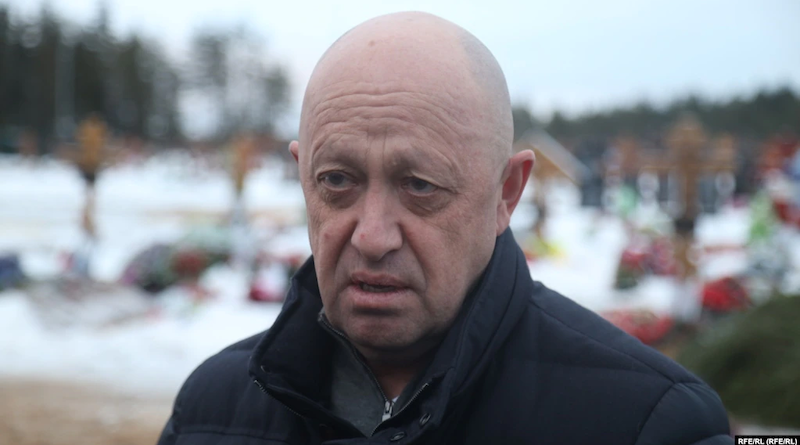
Moscow’s war of aggression against Ukraine has caused a proliferation in the “privatization of force” in Russia (see EDM, February 27; February 28), with Yevgeny Prigozhin, the sponsor and founder of the notorious Wagner Group, enjoying unprecedented publicity.
While some commentators and experts (both in Russia and abroad) argue that Prigozhin is acting as the Kremlin’s henchman whose days may be numbered, the Wagner leader’s strategy is much less obvious and far more complex than it appears on the surface. This is visible in both Wagner’s evolving recruitment approach and the strengthening of ties with influential and potentially useful figures within Russian economic and political circles.
It is clear now that during the Russo-Ukrainian war, one main source of recruitment for Wagner has been the Russian penitentiary system (see EDM, August 18, 2022). Yet, given the rate of attrition and qualities of those recruited, this approach is more suited for specific short-term tasks—such as offensive actions on a specified portion of the battlefield—but may be less effective with respect to long-term, more strategic plans. Given the looming prospects of destabilization and internal rupture in Russia, Prigozhin might already be planning to use Wagner members as a valuable resource in a potential struggle for power (Bugajski, Failed State, 2022). In this regard, however, reliance on ideology-free criminals and ex-convicts will have limited value. Thus, Prigozhin is seemingly altering his recruitment strategy in a number of ways.
First, Wagner is widening the geographic scope and changing its approach in the selection of candidates to join the quasi–private military company (PMC). For the former, Wagner recruitment centers have emerged in no fewer than 42 Russian cities (T.me/concordgroup_official, March 10). In this, Siberia—whether motivated by socioeconomic factors, ideas of regionalism, potential separatism or a combination of all three—is playing an increasingly central role. Social advertisements calling on locals to join the Wagner Group are now being publicly advertised in all major Siberian cities (T.me/Taygainfo, October 4, 2022).
Meanwhile, an investigative report published by Tayga Info shows that, as his target audience, Prigozhin is increasingly relying on sportsmen and members of private security companies (PSCs) and much less on criminals (Tayga.info, March 11). This approach is very much in line with a strategy pursued by Russian “businessmen” in the 1990s, who were particularly interested in hiring sportsmen for their private armies given their high(er) level of discipline, personal loyalty and devotion to leadership (Radio Free Europe/Radio Liberty, May 8, 2016). The report extensively cites boxing and mixed martial arts clubs—as well as some PSCs—in Novosibirsk, Omsk, Barnaul, Irkutsk, Krasnoyarsk and Chita, as the organizations and locations where Wagner is hoping to find new recruits. Aside from Russia (Siberia) itself, Prigozhin is also said to be attempting to recruit new members in the occupied regions of Ukraine—even in Melitopol, among others (Pravda.com.ua, March 13). However, Ukrainian sources related this recruitment to the urgent need to fill the rank-and-file of rapidly depleting Wagner forces near Bakhmut (T.me/militarymediacenter, March 12).
Second, Wagner is expanding its activities among Russian youth—a key quality that confirms Prigozhin’s strategic approach in reinforcing his forces for longer-term goals. While other Russian PMCs have been involved in the military-patriotic upbringing of Russian youth (see EDM, August 12, 2020)—though in a somewhat amateur manner—it seems that, in the case of Wagner, this process might take a much more systemic approach. Specifically, it has been reported that, at the beginning of 2023, on the basis of the so-called “PMC Wagner Center” (located in St. Petersburg), a youth branch named “Wagnerenok” (“little member of Wagner”) was created, where Russian children are acquainted with deputies, journalists and veterans of the Wagner Group and other (para)military formations (Meduza, March 3).
According to Russian sources, the idea of creating the youth branch—incidentally, its participants can receive exemptions from attending their school classes—was expressed personally by Prigozhin (Lenta.ru, March 3). During the inaugural session of the youth branch, young participants listened to a lecture by a former member of the Russian Spetsnaz (and currently a key figure in the Spetsnaz veterans’ organization), Victor Shmarkovsky, who, among other things, boasted about “many of his colleagues currently serving in Wagner Group.” It has also been reported that, during the first month of its existence, the Wagnerenok branch was visited by such controversial public figures as Sergey Mironov (leader of the “A Just Russia” party), Vasily Vlasov (member of the Liberal Democratic Party of Russia) and Maria Butina (member of the United Russia party and a former spy). According to the program’s agenda, its demographic targets are young Russians between the ages of 16 and 25, and its main goal is to “nurture love for the Motherland among young Russians” (Vk.com, accessed March 19).
And third, Wagner is strengthening its “ideological tempering,” which, according to Prigozhin, will dramatically increase the overall effectiveness of Wagner units (see Part Two). As has been pointed out by Prigozhin himself—and this has served as a key platform for the mercenary ideology in Russia (see War by Other Means, accessed March 18)—Wagner`s new ideology should focus on the “pursuit of justice” (Polit.info, March 13). This means that, instead of a group of mercenaries and criminals, Prigozhin is forging the idea of creating an army equipped with a unifying ideology—a force that would become useful to him in the case of a wider internal struggle in Russia
Consequently, it appears that the combination of a growing reliance on Russian youth, sportsmen, and members of PSCs as well as extensive plans to provide Wagner with an ideological backing showcase Prigozhin’s alleged departure from the Wagner Group’s role as a purely mercenary force to an entity that consists of loyal and ideologically trained groups of “stormtroopers,” who would follow their leader in pursuit of his veiled political agenda
